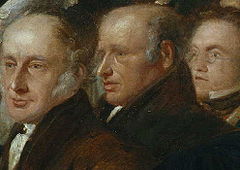William Forster (philanthropist)
| William Forster | |
|---|---|

William between two fellow abolitionists (George Stacey and William Morgan) in a detail from a painting.
|
|
| Born | 1784 Tottenham |
| Died | 1854 Friendsville, Tennessee |
| Resting place | Friendsville, Tennessee |
| Nationality | English |
| Occupation | Preacher and abolitionist |
| Known for | Slavery abolitionist |
| Spouse(s) | 1.Rachel Wilson 2.Sarah Dillworth |
| Children | William Edward |
| Parent(s) | William Forster (1747–1824)and Elizabeth Hayward (1759–1837) |
| Relatives | Josiah Forster (brother), Elizabeth Fry Sister-in-law |
William Forster (23 March 1784 – 27 January 1854) was a preacher, Quaker elder and a fervent abolitionist. He was an early member of the British and Foreign Anti-Slavery Society in 1839. It was William and Stephen Grellet who introduced Elizabeth Fry to her life's work with prisons, but it was William's brother, Josiah, who accompanied Fry on her tour and inspection of prisons in France.
Forster was born in 1784. He initially trained as a land agent with his mother's brother in Sheffield, but he then started to tour England and Scotland as a minister. He visited the Hebrides in 1812 and Ireland in 1813–14.
When visiting Newgate prison with Stephen Grellet, Forster was amazed at its state. He contacted Elizabeth Fry and she gathered together a group of women to help with improving prison conditions. Forster thereby alerted Elizabeth Fry to what was to be her life's work.
In 1816, Forster married Anna Buxton and they moved to Dorset. When his brother-in-law, Sir Thomas Fowell Buxton, entered parliament in 1818, he wrote to him to encourage him to take up the cause of slavery. He noted that the slavery trade had been abolished (in 1807 in the British Empire) but there was still the issue of those who were already slaves.
Doctrinal differences within the Quakers were created by the views of Elias Hicks of New York. Forster highlighted the issue in 1820. Prominent English evangelical Quakers which included Elizabeth Robson, Forster and Anna Braithwaite, decided to travel to the United States to denounce Hicks' views between 1821 and 1827.
Meanwhile, following the Reform Act, William Wilberforce was able to get anti-slavery legislation through parliament. In 1838 legislation replaced slavery with apprenticeship. As a result, in August 1838 800,000 people in the British Empire became nominally free.
...
Wikipedia
